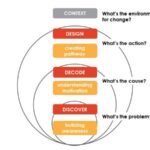Vision for Australia: what to do when technology drives accelerating change

Technology is and will continue to be a driving force for business and change in the future. As part of the ‘A Vision for Australia” consultation, Nina Sochon highlights the lead role technology should take.
“The forces currently at play in today’s workforce will change what it means to work and live.”
In any other era this might have seemed an overstatement. In the current Information Age, the capacity for disruption, volatility and uncertainty in the workforce is greater than ever.
Huge technological change
With increased computing power has come the capacity for drones, 3D printing, smart phones, smart sensor networks and agile robots, to name a few. We also have the capacity to be locally and globally networked like never before.
Exponential growth in computing has now also brought the capacity to solve previously insoluble problems. In 2005 Frank Levy and Richard Murnane, two economists, described driving a car on a busy street as so complex that it could not possibly be mastered by a computer. Yet Google unveiled a small fleet of driverless cars only a few years later.
Humans no longer solve the same problems
The incredible problem-solving power available to us through technology has significant implications for the way we work and live. How does the construction industry deal with the capacity to 3D-print ten homes in less than 24 hours for under $5,000 US dollars? Why did Boston Consulting Group predict earlier this year that by 2025 machines will assume more than 23 per cent of jobs that could be automated? What does that mean for jobs that are currently too complex to automate but could be automated in the future?
Major workforce shifts
The unceasing acceleration of technological change is driving a significant restructure in the nature of the workforce. The global workforce is shifting towards global micro-businesses, greater mobile working and a larger number of small businesses that can now access significant resources online. Phil Ruthven recently predicted that by the second half of this century the term ‘employee’ will be out of vogue.
As Hilary Clinton said in her recent speech outlining her economic agenda: “This on demand or so called ‘gig’ economy is creating exciting opportunities and unleashing innovation, but it’s also raising hard questions about workplace protections and what a good job will look like in the future.”
Another major shift is the declining need for generalist middle managers. Technology can now monitor performance, provide instant feedback and create reports and presentations. Gen Y workers, who will comprise 75 per cent of the workforce by 2025, see little sense in reporting to someone who just keeps track of what they do. On the other hand they value learning from someone with deep skills – a master, not a generalist.
Future challenges
Against this backdrop we have some challenges to address and some future-thinking to do. Do we know how to handle the complexity on the horizon that is already impacting our day-to-day businesses? Do we have a vision of agility? How familiar are we with the skills that we will sustain a resilient, productive workforce?
‘Smart failure’ education
My vision of Australia is one where innovation theory and practice is taught more widely in secondary and tertiary courses of all disciplines. With this will come an increased awareness and tolerance of the importance of ‘smart failure’ – learning from what worked and what didn’t work, adapting and continuing to learn. It will also teach us to value diversity.
Innovation grants
If Australia is to take its share of the innovation pie,our businesses need to be supported to try to be successful with easy access to grants and tax breaks – failure is a necessary part of innovation. The Australian Government would do well to support the incubator model, which doesn’t guarantee a small business’s success but can dramatically increase its chances, partially through a rigorous process of assessing the viability of the business idea but also through access to deeply experienced mentors.
Lifelong learning
How do we develop mastery and sophistication? Through ongoing learning. These four plausible scenarios of Australia to 2025 all highlight the critical importance of a much stronger skills base in Australia. The Australia of the future will invest in its people both at work and in learning institutions. This is also what Gen Y and Millennials want. The attractive workplaces of the future will be the ones that offer highly respected learning opportunities.
Familiarity with complexity
The volatility inherent in a world where disruption is more prevalent is causing us all to become more familiar with complexity. Put plainly, simple systems are predictable, whereas complex systems are unpredictable. Thanks to the scientific method we often look for evidence that an intervention is ‘right’ before acting but complex systems don’t offer that evidence. As a group of workers and voters we need to become more familiar with complex systems and how to work with them, or we will find ourselves laying blame unduly for ‘wrong’ decisions and looking in the wrong places for solutions to complex problems.
Professional resilience
How do we ensure that we as professionals become more resilient to change? A core set of sophisticated professional skills will be the tools in our toolbag: communication (including collaboration and negotiation), project management, leadership, cultural awareness and technological skills. By placing greater emphasis on these we equip a larger group of people to move quickly between and around projects, connecting with a range of potential buyers and collaborating with a range of joint suppliers globally.
Contractors will organise themselves into clusters that come together and move apart for various pieces of work – our banking system and laws need to enable this versatility. Banks will need to be more sophisticated about assessing earning potential – it won’t be enough to record existing salary and assets. A strong and diverse professional network will support every professional to stay connected to opportunities.
How do we facilitate the ability to adapt from an early age? As anyone knows who has coordinated a change program or had any responsibility for delivering change, change is personal. It often affects deeply held views and beliefs. Some people can learn easily how to identify and respond to change. For others, skillful adaptation is learned through experience. My guess is through introducing a little unpredictability as soon as students are mature enough to cope – at school rather than at college or university.
Remote work
Now that 1.3 billion people globally are mobile workers, the Australia of the future needs to be tapping into the benefits of the remote work style: improved productivity, greater workforce participation, reduced stress and reduced commutes. As a flexible work option, remote work styles – such as working from home or from a coworking centre – are highly attractive to around 40 per cent of employees. The productivity gains have been well-proven [PDF download], when the organisation’s remote work strategy is tailored to fit. I look forward to an Australia that videoconferences much more – this will help us mainstream remote work styles and catch up with our international peers.
How can we resolve Australian managers’ sensitivity to remote work styles? The first barrier is relatively simple to resolve: the current Work Health and Safety legislation is designed mainly for the trades. Knowledge workers aren’t treated differently despite the fact that they mainly sit at desks in safe environments. As a result many business owners and managers are now terrified of potential criminal liability. In the future the Australian Government will have no choice but to redress this oversight, particularly as services continue to dominate the economy.
The other main reason for the poor uptake of remote work is the low level of management skill in Australia. We still talk about ‘allowing’ staff to work from home because the systems and behaviours in our organisations haven’t caught up. We need results-based work environments – not just because transparency improves performance but also because the process of establishing Key Performance Indicators is enough to improve productivity. Research bodies should be paying closer attention to remote work in Australia because it is a tool able to achieve a win for businesses, employees and society.
The future is superfast and accelerating. The Australian workforce of the future is smarter and more agile than the one we have today – utilising tried and tested strategies to improve productivity: investing in skills, measuring outcomes and working remotely. A few new strategies need to get a guernsey: teaching and supporting innovation, understanding of complexity and resilience.
This is the Australia we need to work towards because it won’t be enough to hope that the current wave of technological change passes us by – we need new strategies or that wave will feel more like a tsunami. On the other hand once we’re ready the Australian workforce will be in for an incredible ride.
Nina Sochon is the CEO of Transformed Teams. She is a leading expert on remote and flexible work in Australia. Nina has consulted with leading businesses in Australia, conducted research and provided advice to many Australian employers. Nina now assists businesses to drive amazing service outcomes and powerful staff engagement through clear results management, leadership and highly productive remote and virtual work arrangements.


